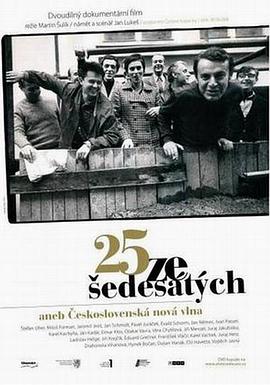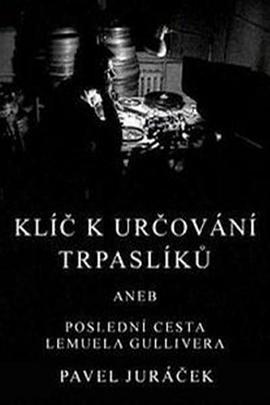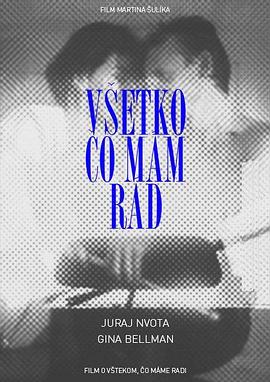-
备注:已完结
类型:纪录片
主演:斯特凡·乌赫尔 米洛斯·福尔曼 Jaromil Jireš 帕维尔·祖
导演:马丁·舒利克
语言:其它
年代:未知
简介: The 2-part feature-length documentary "25 ze šedesátých aneb Československá nová vlna" ("25 from the Sixties, or Czechoslovak New Wave") presents a complex view of the phenomenon of Czech and Slovak New Wave in the cultural and social context of the 60's. 25 fundamental films commented on by their makers and film historians offer the viewer a dramatic insight into the golden era of Czechoslovak cinema. The documentary is a follow-up on the biographical TV series "Zlatá šedesátá" (Czech Television, 2009), based on the filmmakers' personal remembrances. As opposed to the series, the documentary presents the Czech and Slovak cinema of the 60's in the national, international and also inter-generational context. It describes the ways the New Wave crossed the existing artistic boundaries, how it variegated the world cinema and where it left an ineffaceable impression. It analyses the work of filmmakers in a state-funded cinema, under the pressure of ideological demands on one hand and commerce on the other. It presents the dilemma of a man - an artist - on the edge between contradictory social systems and incongruous aesthetic requirements. The existential drama of a man acting freely and at the same time mercilessly crushed by the wheels of the system. The 60's are, from this point of view, mostly an era of fortunate historical constellation, not only in - at that time - Czechoslovakia, but on a world-wide scale. An era of expectations and upswing, but also an era of exemplary human decisions and artistic pursuit. Those are some of the things "25 ze šedesátých aneb Československá nová vlna" wants to commemorate. Part 1 comments on: ■"Slnko v sieti" ("The Sun in a Net," 1962) by Štefan Uher ■"Konkurs" ("Audition," 1963) by Miloš Forman ■"Křik" ("The Cry," 1963) by Jaromil Jireš ■"Postava k podpírání" ("Joseph Kilian," 1963) by Pavel Juráček & Jan Schmidt ■"Každý den odvahu" ("Courage for Every Day," 1964) by Evald Schorm ■"Démanty noci" ("Diamonds of the Night," 1964) by Jan Němec ■"Intimní osvětlení" ("Intimate Lighting," 1966) by Ivan Passer ■"Ať žije republika" ("Long Live the Republic," 1965) by Karel Kachyňa ■"Obchod na korze" ("The Shop on Main Street," 1965) by Ján Kadár & Elmar Klos ■"Romance pro křídlovku" ("Romance for Bugle," 1966) by Otakar Vávra ■"Sedmikrásky" ("Daisies," 1966) by Věra Chytilová ■"Ostře sledované vlaky" ("Closely Watched Trains," 1966) by Jiří Menzel Part 2 comments on: ■"Kristove roky" ("The Prime of Life," 1967) by Juraj Jakubisko ■"Stud" ("Shame," 1967) by Ladislav Helge ■"Svatba jako řemen" ("A Hard and Fast Marriage," 1967) by Jiří Krejčík ■"Drak sa vracia" ("Dragon's Return," 1967) by Eduard Grečner ■"Marketa Lazarová" ("Marketa Lazarová," 1967) by František Vláčil ■"Spřízněni volbou" ("Elective Affinities," 1968) by Karel Vachek ■"Spalovač mrtvol" ("The Cremator," 1968) by Juraj Herz ■"Zabitá neděle" ("Squandered Sunday," 1969) by Drahomíra Vihanová ■"Pasťák" ("The Decoy," 1968) by Hynek Bočan ■"Případ pro začínajícího kata" ("Case for a Rookie Hangman," 1969) by Pavel Juráček ■"322" ("322," 1969) by Dušan Hanák ■"Slávnosť v botanickej záhrade" ("Celebration in the Botanical Garden," 1969) by Elo Havetta ■"Všichni dobří rodáci" ("All My Good Countrymen," 1968) by Vojtěch Jasný
-
备注:已完结
类型:剧情片
主演:马雷克·尤拉切克 Edita Leva Julie Ritzinger
导演:马丁·舒利克
语言:其它
年代:未知
简介: 这是一部关于一位早逝的电影天才的散文式纪录片,《格列佛最后的旅行》用日记+影像的形式再现了1964-1972年捷克导演帕维尔·祖拉塞克的私人生活,他的情感困扰和动荡的时代背景,帕维尔生前只留下了两部电影和33篇日记,1964年29岁的他刚刚独立拍完一部短片并写了几本出色的电影剧本,一个有天赋的年轻编剧即将要成为导演,然而与妻子的矛盾也逐渐显现在艺术家过于自我的生活里,那时新浪潮刚刚萌芽不久,卡罗维发利影展吸引了众多世界的目光,一批刚毕业的青年导演也初露锋芒,包括帕维尔在内的许多人都看到了实现个人梦想的机遇。。。68年前后的改革让布拉格迎来了春天,青年人的生活色彩开始丰富,新潮和时尚充满在这座东欧小城里,可帕维尔的生活却逐渐脱离轨道,妻子离她而去,带走了可爱的女儿,而他正困扰于新剧本的创作,他开始怀疑自己的一些想法,甚至觉得自己也许并不适合做这一行。。。 当苏联坦克悍然侵入布拉格时,帕维尔选择了沉默,并没有像其他人那样走上街头抗议,而是以电影为控诉极权暴力的途径,尽管在《为年轻刽子手的辩护》中这样的主题显得并不是很直白露骨,但事实上隐藏的含意是不言而喻的,而这也决定了帕维尔和他的电影的命运,影片只在一座小剧院里放映了两周就被禁,帕维尔连同埃德尔瓦·朔尔姆、杨·南曼奇、乔拉·赫兹等人一起上了捷克秘密警察的黑名单,他的工作室被迫关闭,胶片拷贝被没收,那段时期他彻底放下了电影,重新组建了新的家庭,并有了儿子,可谁又知道一个受到禁锢而无法展示自己才华的艺术家心中真正的苦闷呢,十七年后当丝绒革命即将爆发之前,54岁的帕维尔却没能等到重获自由的那一天。 影片由帕维尔的儿子马瑞克扮演父亲,片中贯穿头尾的画外音朗读日记也是由他亲自叙述的,导演马丁·苏黎克用家庭电影的实验性拍摄手法将一个艺术家短暂而悲剧的一生展现在观众眼前,时代是如何影响个人的命运,黑白与彩色交织的画面暗示着帕维尔分离的情感世界,一种是与女儿在一起时的温馨,另一种是陷入孤独和迷惘时的无助,在他的眼中我看到了忧伤,即使与家人相处时他的安静的目光背后依然有着深深的痛苦感,对前妻的愧疚,对女儿的思念依然折磨着他的心灵。摄影机始终跟随着主人公,一点一滴地记录下生活的全部,略带苛砾感的影像构建起一个很私人的空间,但生活毕竟是可以被再现的,而特殊的时代却是很难去复制的,所以影片里还插入了不少真实的纪录影像,将真实的场景与演员的再现两者结合为一体,剪接处丝毫没有唐突感。 在我看来尽管帕维尔·祖拉塞克的遭遇能代表捷克新浪潮一代从最初的充满理想到被无情扼杀再到逐渐归于沉寂的悲剧结局,但他更多还是作为一个普通人而存在,他的生活里也有着普通人的爱恨得失,有着那个年代东欧人生活中共同的压抑和痛苦,人们应该记住他和他的电影,记住那段悲伤的往事,但历史并不能倒转,传奇也不可能再去重复。 《格列佛最后的旅行》(The Key for Determining Dwarfs or The Last Travel of Lemuel Gulliver),2002年,58分钟,黑白+彩色,捷克共和国。03年捷克评论家协会最佳纪录片奖;03年德国威斯巴登东欧电影节最佳影片金百合花奖。
-
备注:已完结
类型:剧情片
主演:尤拉伊·恩沃塔 吉娜·贝尔曼 兹德娜·斯图登科娃 伊日·门泽尔 雅各布
导演:马丁·舒利克
语言:其它
年代:未知
简介:At 38, Thomas is at a crossroads in his life. His parents are nonstop guilt-inducers, his ex-wife is always on his back, and his son is far from inspirational. Thomas himself is almost too intellectual to survive daily life. The attentions of a straightforward English teacher seem to be a way out.


